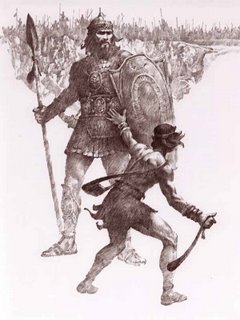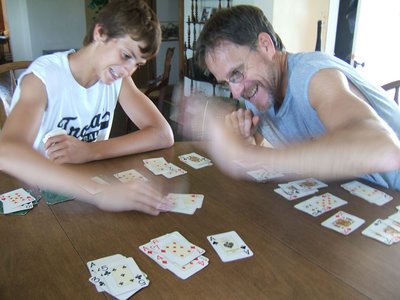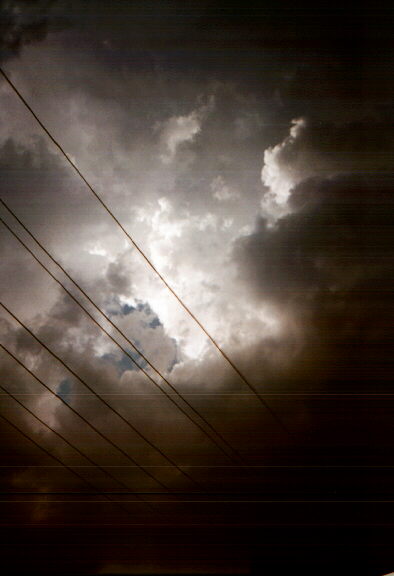My last fitness walk occurred on Monday, May 22. On Monday, May 22, my plan to walk to Pittsburgh died like a bird against a windowpane. To put it yet another way, Monday afternoon, the twenty-second of May, 2006, became my last eight-mile ramble into the rolling countryside. God withheld His new plan for my life until I saw the sign of condemnation planted by the Mennonites.
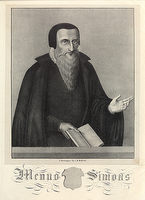
The Mennonites. Thank you, Menno Simons. Just what we needed: another religious sect wearing strange headgear. I had always hoped that condemnation could one day smell like horse poop—alas. And thank you, Jakob Ammann, Amish patriarch, for taking the religious severity of Simons to the highest methane levels possible. Your clippity-clop testimony to the world is: “We’re pleasing God and the rest of you are going to hell in a handbasket.
Can we interest you in a pie?”Several Mennonites in this area have become fond of driving condemnatory religious signs into the fertile, flowered soils of their property. The posts are wooden and uniform of grain and girth; they are birthed, apparently, at the same shop of carpentry. The signposts are as sturdy as the cross that Simons and Ammann crucified Christ upon. The most ingenious feature of the sign is the part of the post holding the epistle itself—it’s a slot, actually—allowing for interchangeable messages of varying degrees of spiritual harm. Oh, and guilt. I almost forgot the guilt.
The menfolk in these parts pound these posts out near the road so the hell-bound, driving past, might quickly imitate the Mennos and save their souls from perdition. Some gospels I have read in the past include: ■ BE YE PERFECT ■ CEASE FROM SIN ■ THE MEEK SHALL INHERIT THE EARTH ■ GOD SHOWS MERCY TO THE MERCIFUL ■ GOD’S WORD: HEED AND OBEY ■ THE WAGES OF SIN IS DEATH.
While these self-righteous salvos—in one form or another—are scripture based, the references are divorced of context and married to the distinct scent of threat. I have not seen a positive message yet. There is nothing of what God has done for humanity. If the cross of Christ has benefited anyone, free of charge, the gratuity is not mentioned, or even hinted at. Those parts of Paul’s letters full of grace, peace, thanksgiving, and the wonders of race-wide vindication, are ignored in favor of those parts deemed by the Mennonites as favoring them and damning the rest of mankind: CEASE FROM SIN. All right, I will. Cross my heart and hope to die, I will. But can I start Monday? I’d like to enjoy the weekend.
The sign in this particular Mennonite yard—located at the two-mile mark of my round—had for months read: GOD SHOWS MERCY TO THE MERCIFUL. True enough—as it stands. But this was an Old Covenant deal between God and man, void of the present grace. The question I wanted answered—directly from the horse’s mouth, as it were—was: What happens to the unmerciful? I often dreamed of asking. In my fantasy, I knock on the Mennodoor in search of a happy sequel. A plain woman answers. Her head is covered, she is aproned, and several Amlets duck and hide behind her skirts.

“Hello,” I say. “My name is Martin Zender, a sinner. Yes, I said, a sinner. I do not even own a hoe and—God help me—I eat cream puffs on the Sabbath. I bathe daily and tumble-dry my clothes. Forgive me; bear with me; have mercy on my mustache. I have read your wonderful sign for many months now, hoping to earn my way into heaven. ‘God shows mercy to the merciful,’ says your wooden headline, and I thank you for it. You are good people, merciful people, reaching out to a sinning man like me who has never once baked a single loaf of bread or fertilized a carrot. May God have mercy upon your household and curse mine in hades, naturally. But before I depart for the underworld, I must know, from a sanctified lip that has never been rouged or glossed: what happens to the rest? What happens to the unmerciful of our sorrowful race?”

In my fantasy, the Mennoness calls up a holy humph from deep behind her epiglottis. At the same time, she snatches up a firepan and a golden snuffer from the altar of God, next to her spatula rack. She then bangs me with the firepan and smites me with the snuffer. It hurts, but I know I deserve it. It is my penance for driving a red car. The Amlets giggle, bite me in the knees, then run away to play on their acacia wood swingset. Things look dim for me, but alas, I shall not return home void.
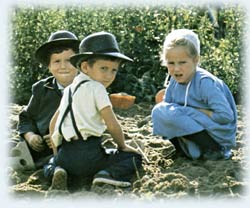
“The rest?” says the Mennoness. “The
rest?” Imitating her favorite Old Testament Prophet, the Mennoness smites me a second time. “The
rest?” she says again (She says it a total of three times, the third time accompanied, in my fantasy, by the third smite of the sacred snuffer.) Three more humphs emerge, each one holier than the last.
“Why, the rest are damned for eternity,” she says, “in hell, of course. Do you not know anything?” In comes the firepan, again, to my forehead. In spite of the ensuing headache, I manage a smile. The Mennoness intends to send me away happy, and she does. She concludes her sermon with a kick to my buttock area and a verse from the book of Exodus, chapter 38, verse 22: “‘Now Belalel, the son of Uri the son of Hur, of the tribe of Judah, made all that the Lord had commanded Moses.’
Go and doest thou likewise!” With the slam of the door, my fantasy is sadly concluded. I have not even received a gardening tip!
Back now to Monday, May 22, just past noon. My fantasy is not only dissolved, it is dead. For in the place of the MERCIFUL sign is a new sign that makes the old sign look like a peace sign:
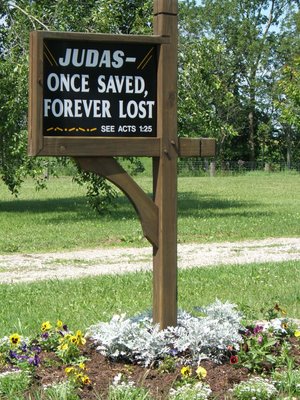
Dear God, Moses, Abraham, and Lot. Why me? Why must I suffer so upon this vale of tears? Is it fair that I should have been made a modern-day apostle, a sent-one, a teacher, a bearer of the glad tidings of God? A light in the midst of the darkness? A fine-tuned discerner of all things dark? And what darkness! Poor Judas, a man, set apart by God from his mother’s womb for dishonorable use, chosen by Christ Himself, possessed in the end by none other than Satan, steamrolled by the God-machine of divine inevitability, freed at last from the demonic oppression, remorseful, self-loathing, hanging himself, burst open at the belly, disemboweled, buried, only to happen upon—today—this rude disinterrment, dragged from his peaceful sleep, hung from a new tree, used, abused, his same tangled bowels rearranged upon a Mennonite signpost for the admonition of moderns who could not—ever—offend the Deity in a like manner as he.
And Acts 1:25? Dear God, take me now.
“And praying, they say, ‘Thou, Lord, Knower of all hearts, indicate one whom Thou choosest, out of these two to take the place of this dispensation and apostleship, from which Judas transgressed, to be going into his own place.”

“To be going into his own place”—a simple euphemism for the grave. To the hell seeking Mennonite, however, it is synonymous, in the case of their favorite whipping boy, with eternal separation from God. That this is their proof text exposes both the state of their scholarship and the state of their hearts.
It exposed, for me, the course of my next sixty years.
The sign affected me deeply, powerfully—not in the way the Mennonites hoped, but in a way aligned with the purposes of God.
God, my father. He has called me, in this life, to defend His character. He has no need for such human assistance, but he condescends to inspire and accept it for the sake of honoring those called to it. I defend Him neither for reward nor for honor, but because I have to. It is woe to me if I don’t. It is woe to me either way, truth be known, because I feel the heartache God feels when He sees this sign. I have sympathy pains. The message harms me. I have a problem with it. The worldly man ignores it, the religious man applauds it, but the man standing stock still now in all his useless walking gear feels it grinding in his gut.
To unscripturally condemn a man to an unscriptural hell for an unscriptural eternity is to condemn the man’s God along with him. It is to condemn the One Who created him in His own image, for His own glory. The apostle Paul said of the Jews in Romans 2:23-24, “You who are boasting in a law, through the transgression of the law you are dishonoring God! For because of you the name of God is being blasphemed among the nations, according as it is written.”
Think if Paul had met the Mennonites.

It is true that Judas Iscariot disqualified himself, relatively speaking, from the glories of Christ’s millennial kingdom. The thousand years of peace will find the human betrayer of Christ still in the grave. He will rise at the great white throne, however, to be judged and adjusted by God for his sin. This adjudication does not satisfy some divine vindictive streak. Rather, it is for Judas’s own good. Here before God’s majesty, Judas will apprehend, at last, the glories that eluded him on earth. And yet God has not appointed him to live for the eons, so he is returned to the grave: the second death. Is this the end of him? It cannot be, for God is called, in 1 Timothy 4:10, “the Savior of all mankind.” Unless He saves all mankind, the inspired appellation is a joke.
The inspired appellation—I assure you—is not a joke.
The Apostle Paul, by divine inspiration, wrote in 1 Corinthians 15:26 that, at the consummation of the eons, death is to be abolished. For those in the second death, this means deliverance into life. The Apostle John, also inspired by God’s holy spirit, quoted John the Baptist in John 1:29, “Lo! The Lamb of God Which is taking away the sin of the world.” Did he mean all the sin of the world, or all sins except that of Judas?
Take a guess.
If you can’t get it right now, don’t worry. You will. You’ll get it right eventually. You’ll figure it out in a high place on a future day when you hear a voice louder than all others praising God for His wisdom, patience, mercy, and love—and worshipping the One he necessarily betrayed—worshipping Him for His plan, His purpose, and for dying, yes, even for the likes of him.
As for me, standing and shaking before this blasphemy in flowers, I realize that I am still not doing enough. With so much darkness in the world, I must make better use of my time. There are other paths to fitness besides those requiring a quarter of a work day. It is time to reclaim the era and take God’s light into every place.

Except here. This place already thinks it has it, so its eonian course is set. So I shake the dust off my shoes, finish my walk, and devise ten new ways to publish the truth.
The Mennonites? I leave ‘em to their fantasies. Their spiritual light bulbs ain’t coming on until Judas’s does.
© 2006 by Martin Zender

 © 2006 by Martin Zender
© 2006 by Martin Zender








